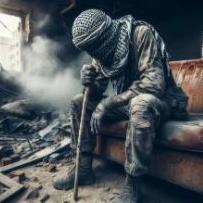"I was under the bridge trying to get drugs when I felt a hand grab me from behind. It was the Taliban. They had come to take us away."
Mohamed Omar remembers the moment when Taliban soldiers appeared unexpectedly on the Pul-e-Sukhta bridge in western Kabul.
Long before the hardline Islamist group returned to power in August 2021, the area was a notorious hotspot for drug addicts.
In recent months, the Taliban have been rounding up hundreds of men throughout the capital: on the bridge, in the parks and on the hills. Most have been moved to a former US military base, now a makeshift rehabilitation center.
The capital of drug addiction
Afghanistan is the drug capital of the world. It is estimated that 3.5 million people are addicted, in a country of about 40 million inhabitants, according to the International Bureau of Narcotic Drugs and Security Forces.
Under the Pul-e-Sukhta bridge, it is common to see hundreds of men squatting, hunched over piles of rubbish, syringes, feces and, occasionally, the corpses of overdosed people.
The stench under the bridge is overwhelming, with dogs rummaging through rubbish heaps for scraps of food.
Above, traffic flows, street vendors offer wares and commuters rush to catch buses at the stop.
"I would go there to see my friends and take drugs. I wasn't afraid of death. Anyway, death is in God's hands," says Omar.
a hard strategy
Most of the men who lived in this place had been forgotten, despite the previous government's policy of rounding up addicts and placing them in centers. But when the Taliban retook control of the country, they launched a tougher campaign to get them off the streets.
"They used tubes to whip and beat us," says Omar. "I broke my finger because I didn't want to leave the bridge and I resisted. Still, they forced us off."
Omar was pushed onto a bus, along with dozens of others.
Images later released by the Taliban government showed its soldiers clearing the area of addicts who had died of overdoses.
Their lifeless bodies were carried wrapped in dark gray shawls. Others, still alive, had to be carried out on stretchers because they were unconscious.
The rehabilitation hospital where Omar was taken has 1,000 beds and currently 3,000 patients.
The conditions are miserable. The men remain in the center for about 45 days, during which they undergo an intense program before being discharged.
There is no certainty that these patients will not relapse.
While the overwhelming majority of those taken off the streets are men, some women and children have also been taken to specialized rehabilitation centers.
Omar, like the rest of the addicts in the room in the center of Kabul, is very emaciated, with the brown clothes -provided by the authorities- loose and an emaciated face.
Sitting on the edge of the bed, he describes the life he once had.
"One day he was in Dubai, the next in Turkey and sometimes in Iran. He traveled the world as a flight attendant for Kam Air and often had VIP guests, such as former presidents, on the plane," he recalls.
He lost his job when he fell Kabul. Faced with financial difficulties and an uncertain future, he turned to drugs.
Drug trafficking for the Taliban
When the Taliban came to power in the 1990s, they virtually eradicated opium poppy cultivation, from which the opium used to make heroin is extracted. However, drug trafficking became a major source of income for them throughout their 20-year insurgency.
Now the Taliban claim to have ordered an end to the poppy trade and are trying to enforce this policy. But according to the UN, cultivation increased by 32% in 2022 compared to 2021.
Meanwhile, the Afghan economy is on the verge of collapse, plagued by the loss of international support, security concerns, weather-related issues and global food inflation.
Since he arrived at the rehab center, Omar has been determined to get better.
"I want to get married, have a family and lead a normal life," he says. "These doctors are very kind. They do everything they can to help us."
For the center's doctors, it is a rudimentary operation. The Taliban continue to bring in more people and the staff are struggling to find places for them.
"We need help. The international community left and put an end to their help. But our problems have not disappeared," one of the doctors explained to the BBC.
"There are many professionals within this group. Intelligent, educated people, who used to have good lives. But the difficulties of our society, poverty and lack of work make them look for an escape route," he adds.
Despite overcrowding and a lack of resources, doctors remain committed to doing whatever they can to help addicts.
"There is no certainty that these patients are not going to relapse once they are out. However, we have to keep trying, and more importantly, we have to give them hope for the future. Right now, there is none."
https://www.bbc.com/mundo/noticias-internacional-65189933










.thumb.jpeg.c188c80d91ba3f10a7905c4d29de083b.jpeg)
